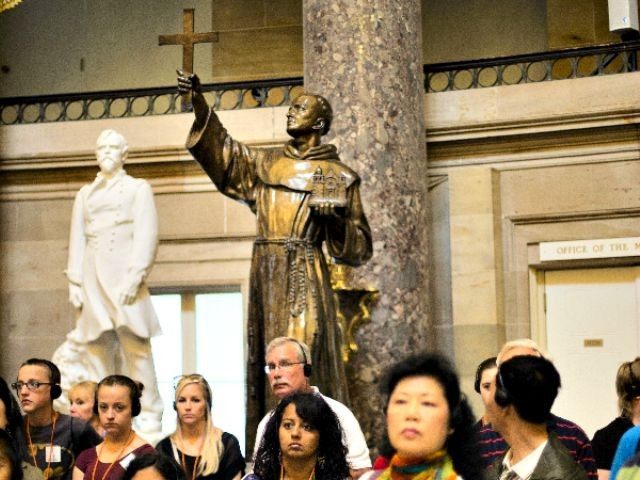On Wednesday afternoon, Pope Francis canonized Father Junípero Serra, a Franciscan friar who founded a chain of Catholic missions up and down the coast of California, each of which would become a major Californian city, such as San Diego, Santa Clara. and San Francisco.
This was the first canonization ceremony ever to take place on American soil, and America’s thirteenth canonized saint. Father Serra was also a supporter of the aspirations to independence of the colonies in the East, and he actually took up a collection to send to General George Washington.
In his homily, Pope Francis held up the missionary as an example of how to live one’s Christian faith with joy. “How do we make the joy of the Gospel increase and take deeper root in our lives?” Francis asked. Joy increases when we share the faith with others, he said.
The Pope has taken considerable heat for proclaiming Father Serra a saint, as the left has done all in their power to disparage him, calling him a spiritual colonizer who colluded with Spanish authorities in order to make converts out of Native American Indians, trampling their culture and religions. They have also blamed Serra for bringing European diseases that wiped out large numbers of Indios.
In the minds of many on the left, Serra represents Christian imperialism, which sought to make believers out of everyone they met, spreading their Eurocentric view across the globe.
As an article in the Daily Beast put it, “On a systemic level, his very mission was Eurocentric in the extreme, and the way it was carried out was violent, brutal, cruel, and ultimately genocidal. These are not mere imperfections in an otherwise glorious campaign; they are cracks at the heart of the mission itself, and cannot be mended.”
Far from backing away from his decision, however, Pope Francis doubled down, insisting that “Jesus sends his disciples out to all nations. To every people.”
Rather than apologize, Francis said that we all should do the same: “So let us go out, let us go forth to offer everyone the life of Jesus Christ. The People of God can embrace everyone because we are the disciples of the One who knelt before his own to wash their feet.”
Once we were on the receiving end of that message, the Pope insisted, “We too were part of all those people of two thousand years ago.”
A missionary, an evangelizer is just doing what Christ commanded him to do. “Jesus said: Go out and tell the good news to everyone,” he said.
“Go out to the highways and byways,” Francis continued. “Go out to tell the good news fearlessly, without prejudice, without superiority, without condescension, to all those who have lost the joy of living. Go out to proclaim the merciful embrace of the Father.”
“Mission is never the fruit of a perfectly planned program or a well-organized manual. Mission is always the fruit of a life which knows what it is to be found and healed, encountered and forgiven. Mission is born of a constant experience of God’s merciful anointing,” he said.
“The reason we are here today is that many other people wanted to respond to that call,” he said. “We are indebted to a tradition, a chain of witnesses who have made it possible for the good news of the Gospel to be, in every generation, both ‘good’ and ‘news.’”
In his homily, Francis called Father Junípero Serra “the embodiment of a Church which goes forth.” He said that Fr. Serra was “one of those witnesses who testified to the joy of the Gospel in these lands.”
“Junípero Serra left his native land and its way of life,” Francis said. “He was excited about blazing trails, going forth to meet many people, learning and valuing their particular customs and ways of life. He learned how to bring to birth and nurture God’s life in the faces of everyone he met; he made them his brothers and sisters.”
The Pope also defended Father Serra’s record with the Indios, arguing that he “sought to defend the dignity of the native community, to protect it from those who had mistreated and abused it. Mistreatment and wrongs which today still trouble us, especially because of the hurt which they cause in the lives of many people.”
Follow Thomas D. Williams on Twitter @tdwilliamsrome

COMMENTS
Please let us know if you're having issues with commenting.